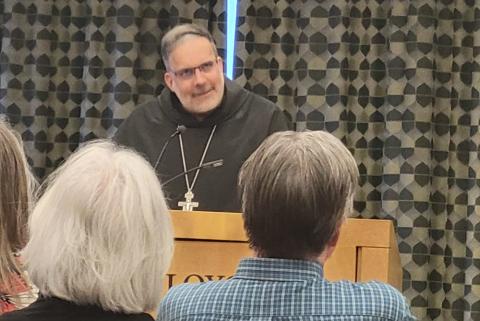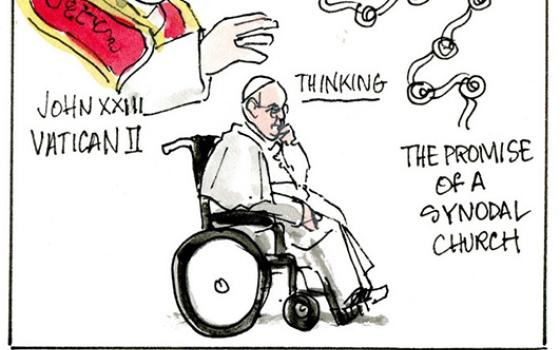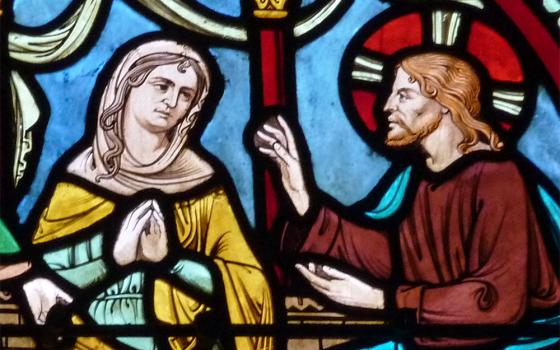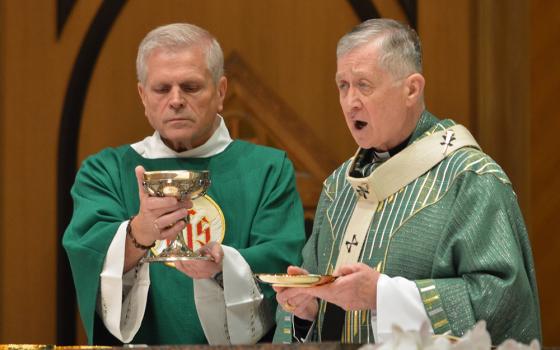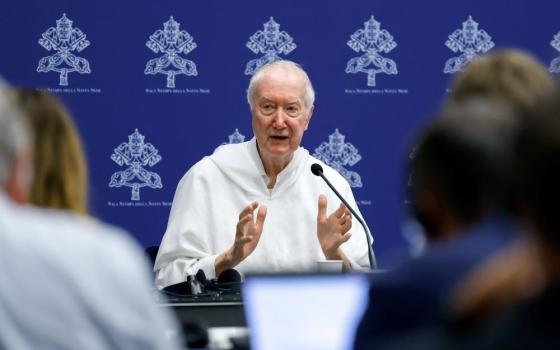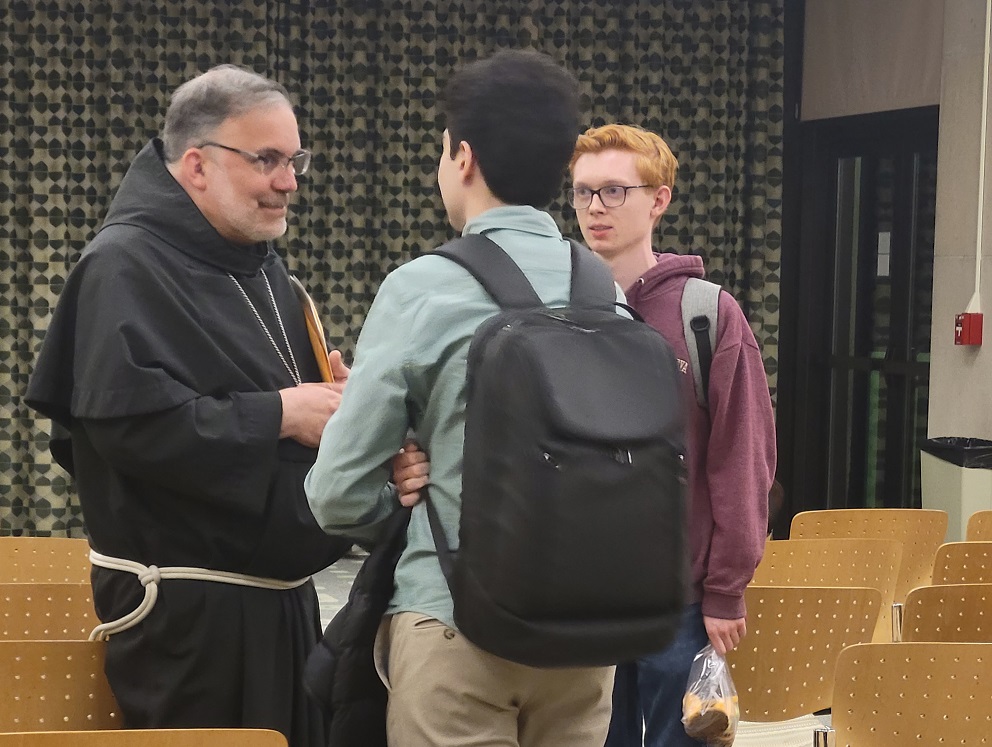
Bishop John Stowe of Lexington, Kentucky talks with students from Loyola University Chicago after the bishop's talk on "The Common Good and Synodality: The Vision of Pope Francis" April 11. (NCR photo/Heidi Schlumpf)
A U.S. bishop who helped draft the synthesis document for the North American continental phase of the ongoing process for the Synod of Bishops said he saw "notable differences" in this phase's virtual listening sessions, compared to input from the previous parish- and diocesan-level phase.
"Concerns about the direction of the synod were more pronounced," said Bishop John Stowe of Lexington, Kentucky, noting that among the concerns of those delegates, who were handpicked by bishops, were restrictions against the pre-Vatican II Latin Mass, possible changes to Catholic doctrine, the focus on inclusivity and the synod process itself.
Stowe made his remarks in an April 11 talk on "The Common Good and Synodality: The Vision of Pope Francis"* as part of the Cardinal Bernardin Common Cause lecture series at the Hank Center for the Catholic Intellectual Heritage at Loyola University Chicago.
Stowe said he was sure the late Cardinal Bernardin of Chicago "would have enthusiastically engaged the synodal process with all of the hope it offers for a church that is faithful and engaged as a servant of the human family."
Advertisement
The three-phase synodal process began in 2021 with parish-level listening sessions across the world that culminated in a Vatican working document that many participants say accurately summarized the input from those sessions. Phase 2, titled the "continental phase," required additional input from Catholics grouped across each of the seven continents.
The North American group, which included the United States and Canada, was the only group of the seven not to hold in-person meetings for the continental phase, Stowe said, instead conducting their sessions with bishops and two delegates selected by each diocesan bishop via Zoom.
"Asia, Europe and Africa with their vast geographies and cultural diversity were able to conduct continental assemblies. Even the Middle East created such an assembly," he said. "North America did not, citing economic and practical difficulties in coming together."
As part of the national synthesis team and as the episcopal coordinator for the region of the ecclesial provinces of Louisville, Kentucky; Mobile, Alabama; and New Orleans, Stowe noted that participants in the previous phase of the synod process expressed a "palpable love for the church," despite frustrations and calls for change about issues including women's roles and the place of LGBTQ people in the church. Many were grateful to have been listened to and expressed a desire for a more welcoming church, he said.
But during the continental meetings on Zoom, other concerns dominated the conversations, Stowe said. Among them, the bishop said, were:
- concerns about the "direction of the synod";
- "questions about whether the synod was trying to change doctrine" and "opposition to that possibility";
- "calls for greater precision about what inclusivity might mean and who it might involve";
- and "discussions of liturgical tensions and the loss of the Latin Mass."
Those concerns were even more pronounced during a special clerical listening session, also held by Zoom, created after the U.S. bishops' conference staff noted the low participation of priests in the synod process, said Stowe. Each bishop was asked to name two priests — one older and one more recently ordained — for that session, which was "unofficial," Stowe said, and did not factor into the synthesis.
Stowe believes Francis' revisioning of the synod process may be his most lasting contribution to the church.
"Francis is also reformulating the use of synods so that they are not only periodic events for convening bishops in affective collegiality but that they become the new way of being the church at every level," he said. "If this attempt is successful, its impact will be comparable to that of the Second Vatican Council."*
While Francis does not appreciate bishops-only synods that "rubber stamp decisions and directives made elsewhere, mainly by the Roman Curia," he also does not believe synods should function in a parliamentary fashion, Stowe said.
"Real synodality should not have winners and losers," he said. "If people are not open to a change of heart through dialogue, they have yet to learn the synodal method."
In the United States, Stowe has observed "enthusiasm for the process of listening and consultation," and "well-founded wariness about whether anything will come out of it," as well as "critiques of the process, suspicions of its agenda and attempts to discredit it."
"Reception by the bishops in the United States can be characterized as lukewarm at best," Stowe said. "There are places in the country where the synod has been embraced and eagerly implemented and places where there has been little to no engagement with the process."
"Reception by the bishops in the United States can be characterized as lukewarm at best."
— Bishop John Stowe
In his own region, for example, some dioceses did only an online survey, which Stowe noted could be a helpful tool, especially in reaching the "disaffected and alienated."
"But an online tool alone can hardly be an expression of the 'walking together' that the synod is supposed to be about," he said.
He also said that in the U.S., the bishops' planned National Eucharistic Revival has received "far more energy, attention and resources" than the synod, perhaps in part because the nature of that event better matches American pragmatism.
"It does not strike me as coincidental that much of the Eucharistic Revival focuses on eucharistic adoration, passive in nature, and offers an alternative to the active engagement of walking together synodally," he said.
Stowe, who is a Franciscan, said that in his encyclicals, especially "Laudato Si', On Care for Our Common Home" and Fratelli Tutti, "this first Jesuit pope in history has given the global church a very healthy dose of Franciscan spirituality."
"Francis, like the council which forms his ecclesiology, is interested in a church in the service of the world, filling that world with the Gospel in deed as much as in word," Stowe said. "The embrace of synodality has the potential to revive and enliven the church under the guidance of the Holy Spirit, and this church will strive to lead humanity to greater fraternity and unity for our survival and hopefully our flourishing."
*Editor's note: This story has been updated to correct the title of Stowe's lecture and to fix a typographical error in the 12th paragraph.

